Month: January 2024

MMS • RSS
MongoDB’s Strategic Growth and Influence in the Indian Market

In an elaborate exposition of MongoDB’s business strategy and achievements in India, Himanshumali, the Principal Solutions Architect at MongoDB, outlined the company’s robust presence and rapid growth in the Indian market. MongoDB currently boasts over 500 employees and 3,100 customers, growing at an impressive annual rate of over 40%.
MongoDB: Aiding Developers in Building a Scalable Future
The company’s primary focus is providing developers with the necessary tools to create scalable software and applications. MongoDB’s services, such as MongoDB Atlas, have proven instrumental for clients like TATA Digital and Zomato, among others. In essence, MongoDB is steadily fostering a robust developer community through various events and initiatives.
AI Integration: A Game-Changer for MongoDB
A key highlight of MongoDB’s strategy is the integration of Artificial Intelligence into its products. This integration significantly enhances developer productivity by automating tasks and offering services like Vector Search and integration with Amazon Bedrock for building AI applications on AWS.
Amplifying Developer Support with MongoDB Tools
MongoDB supports developers through innovative tools like MongoDB Compass, Atlas Charts, and the Relational Migrator. Furthermore, MongoDB has an interactive chatbot in documentation and has collaborated with AWS for Amazon CodeWhisperer, offering enhanced application development suggestions.
Atlas Vector Search and Atlas Search Nodes: Dedicated AI and Search Infrastructure
MongoDB Atlas Vector Search and Atlas Search Nodes provide a dedicated infrastructure for AI and search capabilities. Notable Indian customers, including Darwinbox and Zomato, have entrusted MongoDB with their operations, underscoring the company’s pivotal role in the tech industry.
MongoDB’s AI Innovators Program: Boosting AI Startups
MongoDB recently launched the AI Innovators Program to support startups with AI solutions. The program offers credits, expert sessions, and collaboration opportunities, promoting growth and innovation in the AI sector.
Despite the growth of AI in India, there is a skills gap, with many developers lacking the necessary expertise. MongoDB’s Academia program aims to bridge this gap by providing education and resources to students and educators.
With a 45.42% market share in the NoSQL Databases category, MongoDB has expanded its customer base in India. It currently has 67,891 customers compared to Google Cloud Datastore’s 822 customers, demonstrating MongoDB’s dominance in the United States, India, and the United Kingdom.
MongoDB Atlas Vector Search simplifies generative AI and semantic search capabilities into …

MMS • RSS

MongoDB is a source-available, cross-platform, document-oriented database program. Classified as a NoSQL database product, MongoDB utilizes JSON-like documents with optional schemas. MongoDB is developed by MongoDB Inc., and current versions are licensed under the Server Side Public License.
Himanshumali, Principal Solutions Architect in India, MongoDB, tells us more. Excerpts from an interview:
DQ: What is your India business strategy? Explain the success and challenges that you have faced in the India market?
Himanshumali: With a robust foundation established in India, our organization boasts a workforce comprising 500+ dedicated individuals and 3,100 customers in India. That number is growing at more than 40% year on year. Our primary objective within the Indian market is to provide developers, technological innovators, and enterprises with the tools and support they need to effortlessly create cutting-edge, scalable software and applications.
As we continue to expand our presence, our teams are delving further into the realm of enterprise solutions, catering to the needs of some of the nation’s most prominent businesses.
MongoDB Atlas is one of the most critical, must-have technology platforms because it is uniquely positioned to enable organizations of all shapes and sizes to modernize, innovate, and deliver the business outcomes that drive success—all on one developer data platform.
MongoDB gives its tens of thousands of customers the best platform for building AI applications with Atlas—across the enterprise for any workload, with new capabilities that are critical for organizations today and necessary to usher in the next technological shift in software we’re seeing. Some of our key clients who’ve benefited from Atlas are TATA Digital, Adani Digital, Canara HSBC Life Insurance, Zomato, TATA AIG general Insurance and many others.
MongoDB is dedicated to empowering developers in India by providing essential tools and support for creating cutting-edge, scalable software and applications. We firmly believe that developers play a crucial role in the growth of Indian companies. MongoDB is also actively involved in organizing local events, workshops, webinars, hackathons, and other initiatives. This multifaceted approach underscores MongoDB’s commitment to nurturing a thriving developer community in India.
The success and impact MongoDB has achieved in India showcase its dedication to driving technological advancements and facilitating business growth through innovative and scalable solutions.
DQ: AI is becoming a central part of every technology company today. What is MongoDB’s AI play?
Himanshumali: According to Gartner, the prevalence of generative artificial intelligence (GenAI) application programming interfaces (APIs) or models is expected to surpass 80% adoption among enterprises by 2026. This underscores the growing significance of AI in shaping the future of business operations. Recognizing this trend, MongoDB is committed to empowering developers and enhancing their experience throughout the entire application development cycle by integrating AI into its products and services.
GenAI, with its ability to initiate new code creation and automate operational processes, stands out as a powerful tool in augmenting developer productivity. By reducing repetitive tasks, AI-driven tools enable developers to channel their efforts into impactful innovation.
MongoDB is actively leveraging this potential to benefit developers who are rapidly deploying modern, data-driven applications on MongoDB with minimal friction. Vector search and, more broadly, AI, are more popular now than ever. These terms are arising everywhere. Technology companies around the globe are scrambling to release vector search and AI features in an effort to be part of this growing trend.
As a result, it’s unusual to come across a homepage for a data-driven business and not see a reference to vector search or large language models (LLMs). In this blog, we’ll cover what these terms mean while examining the events that led to their current trend.
Atlas Vector Search helps to search unstructured data. One can create vector embeddings with machine learning models like OpenAI and Hugging Face, and store and index them in Atlas for retrieval augmented generation (RAG), semantic search, recommendation engines, dynamic personalization, and other use cases. With Atlas Vector Search, developers can build AI-powered experiences while accessing all the data they need through a unified and consistent developer experience in the form of the MongoDB Query API.
Additionally, MongoDB very recently announced plans to integrate MongoDB Atlas Vector Search with Amazon Bedrock to enable organizations to build next-generation applications on Amazon Web Services (AWS) and their industry-leading cloud infrastructure.
MongoDB Atlas Vector Search uses an organization’s operational data to simplify bringing generative AI and semantic search capabilities into applications for highly engaging and customized end-user experiences. This integration will make it easier for developers to create applications on AWS that use generative AI to complete complex tasks for a wide range of use cases and deliver up-to-date responses based on proprietary data processed by MongoDB Atlas Vector Search.
Overall, we recognize the transformative power of AI in developer workflows, and are dedicated to providing tools and services that not only keep pace with industry trends but also empower developers to drive innovation in the ever-evolving landscape of technology in India.
DQ: How does MongoDB’s offerings help developers in creating more efficient and innovative AI based applications?
Himanshumali: MongoDB’s strategic integration of AI into its products and services is a game-changer for developers, facilitating the creation of more efficient and innovative AI-based applications. With features like natural language processing in MongoDB Compass, developers can rapidly generate executable MongoDB Query API syntax, streamlining the development process and simplifying application building on the MongoDB platform.
Additionally, AI-driven data visualizations in Atlas Charts empower customers to extract data-driven insights faster, enabling high-velocity decision-making. The automated conversion of SQL queries to MongoDB Query API syntax within MongoDB Relational Migrator eliminates tedious tasks, allowing developers to migrate large monolithic applications seamlessly and efficiently, without downtime.
Moreover, the interactive chatbot in MongoDB Documentation enables developers to ask technical questions and troubleshoot challenges, receiving detailed and intelligent support instantly. These innovations not only enhance productivity but also provide developers with a head start in building high-performing applications with sophisticated capabilities.
MongoDB’s offerings cater to a broad spectrum of customers across industries, from startups to large enterprises, highlighting its pivotal role in the development and scaling of applications.
MongoDB, and Amazon Web Services, recently announced their collaboration for Amazon CodeWhisperer and to further provide enhanced suggestions for application development and modernization on MongoDB’s industry-leading developer data platform that millions of developers and tens of thousands of customers rely on every day for business-critical applications.
MongoDB Inc. also announced the general availability of MongoDB Atlas Vector Search and MongoDB Atlas Search Nodes to make it faster and easier for organizations to securely build, deploy, and scale next-generation applications at less cost.
MongoDB Atlas Vector Search simplifies bringing generative AI and semantic search capabilities into real-time applications for highly engaging and customized end-user experiences using an organization’s operational data. MongoDB Atlas Search Nodes provide dedicated infrastructure for applications that use generative AI and relevance-based search to scale workloads independent of the database and manage high-throughput use cases with greater flexibility, performance, and efficiency.
Together, these capabilities on MongoDB Atlas provide organizations with the required foundation to seamlessly build, deploy, and scale applications that take advantage of generative AI and robust search capabilities with greater operational efficiency and ease of use.
DQ: Please share some names of start-up and enterprise customers along 1-2 short case studies.
Himanshumali: Some of the notable examples of our Indian customers include where MongoDB played a crucial role in their success includes:
- Darwinbox, since its inception in 2015, Darwinbox has experienced remarkable growth, evolving into a global HR Software-as-a-Service (SaaS) platform with a presence in 116 countries, serving over 850 customers and accommodating more than 2.2 million daily users. The platform, supported by MongoDB Atlas, efficiently manages the vast volume of data generated, exceeding 250TB. MongoDB’s document-based database, scalable architecture, and robust security seamlessly address Darwinbox’s needs.
The aggregation framework of MongoDB ensures impressive performance, delivering near real-time insights for HR leaders. With MongoDB Atlas, the complexities of internal management, including configurations, upgrades, monitoring, and backups, are streamlined, offering a lean architecture and efficient managed services. The flexibility of MongoDB proves invaluable for Darwinbox, enabling easy adaptation to new changes or customizations in their dynamic and expansive operations.
- Zomato is one of India’s largest consumer technology companies. The restaurant aggregator and food delivery operator provide restaurant information, menus and user reviews, and food delivery options from partner restaurants in over 1,000 Indian cities and towns. With over 17.5 million customers, 220,000 restaurant partners and 350,000 delivery partners, Zomato deals with data in huge quantities.
However, in 2017 Zomato became increasingly aware of the pain points of database management. Using features such as index suggestions, geospatial queries and analytics nodes, MongoDB is now the driving force behind many of Zomato’s key operational systems such from order tracking, assignment, order details to the delivery partner expected earnings, featured restaurants and delivery partner onboarding system and more.
DQ: Please elaborate on MongoDB’s AI Innovators Program?
Himanshumali: The MongoDB AI Innovators Program is a program designed to help early-stage startups build AI-powered solutions and bring them to market more quickly. The program offers free credits for MongoDB products, including Atlas Database, Atlas Vector Search, Atlas Search, Atlas App Services, and more, to supercharge data infrastructure. Startups can receive dedicated one-on-one sessions with experts to receive personalized recommendations to add scale and solve problems.
The program also offers opportunities to collaborate with MongoDB’s product and partner teams, and to create go-to-market partnerships with MongoDB. The program consists of the AI Startups track for early-stage ventures and the AI Amplify track for more established organizations. The program is intended for startups at Series A or earlier, building a product or service. Startups must have already been accepted into the MongoDB for Startups program to be eligible for the AI Innovators track.
DQ: How are you seeing the AI trend play out in India?
Himanshumali: While more and more companies in India are integrating AI in India, there is definitely a skill gap that needs to be bridged. Many Indian organizations are struggling to find developers with the skills needed to build modern applications and take advantage of new technologies like generative AI that are propelling a wave of innovation and disrupting industries.
According to a report by the NASSCOM, only 35% of the 800,000-computer science, IT, and math graduates in India possessed the necessary skills required to enter high-demand tech roles. This gap underscores the need for increased collaboration between industry and academia to provide the real-world training needed to upskill students and educators in India to meet the demands of the country’s large and growing tech industry.
Our Academia program in India gives educators and students the knowledge and skills needed to help close this gap by learning how to use MongoDB Atlas, which integrates all the data services needed to build modern applications with a unified developer experience.
Under the program, students and educators get access to hundreds of thousands of dollars’ worth of MongoDB Atlas credits as well as free certification that validates developer skills on MongoDB to employers. Free curriculum resources and training to help students gain the skills they need to build, manage, and deploy modern, business critical applications.

MMS • Sergio De Simone

GitHub has recently extended its CodeQL-based code scanner by adding the possibility to specify the desired threat model. The new feature is available in beta for the Java language.
The new feature is implemented as a setting that allows users to select which threat model should be used to decide what input data can be trusted and what data should be considered as a potential source of risk for the system.
In its default configuration, CodeQL uses a threat model that considers any remote sources, including HTTP requests, as tainted, i.e., untrusted. This will be fine for the vast majority of codebases, says GitHub, but many of them will want to extend the set of tainted input data sources by including local files, command-line arguments, environment variables, and databases:
You can enable the local threat model option in code scanning to help security teams and developers uncover and fix more potential security vulnerabilities in their code.
To enable the new option, you can either use the GitHub UI, where the Threat model setting is listed along with the Query suite setting, which allows you to select the group of CodeQL queries to run against your codebase.
Alternatively, you can enable it by specifying threat-models: local in an Actions workflow file.
Finally, if you run CodeQL scanning through the command line or in a third-party CI/CD, you can provide the --threat-model=local flag.
By extending CodeQL settings with the possibility of specifying the threat model to use, GitHub is making its code scanning solution more adaptable to different codebases by providing it with specific information about the context where code scanning takes place.
Understanding the threat model associated with a system or codebase is a key step to ensure its security. According to the Threat modeling manifesto, this kind of analysis starts with identifying what can go wrong and listing all possible threats. Threats are usually specific to each system and depend on how it was designed and implemented.
As is the case with many security-related practices, the earlier you identify threats, the better you can address them. Code scanning can be seen as a “shift-left” approach to improving the security of a system, failing which you can define mitigations in later phases of the system’s lifetime.
While adding support for a local threat model is undoubtedly a step forward in GitHub’s offering, there are many additional dimensions to code scanning threat modeling it does not cover yet, including authentication, frequency of execution, accessed resources, protected assets, and so on.

MMS • RSS
MongoDB: A Promising Stock Marred by High Valuation and Decelerating Growth
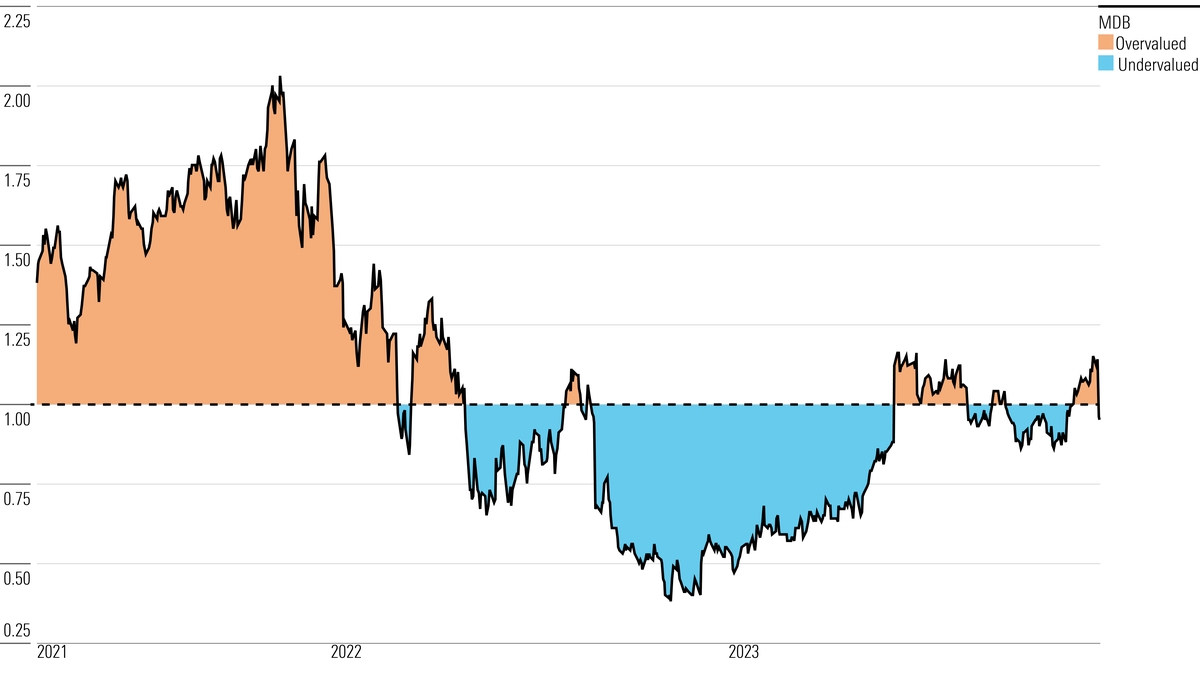
As we approach the Federal Reserve’s pivot in 2024, the stock market is riding a wave of unwavering optimism. Indices like the S&P 500 and Nasdaq are inching towards record-breaking highs. A prominent player in this upswing is the growth stock, MongoDB (MDB), which has demonstrated a significant recovery after a dramatic 70% fall due to inflation and interest rate hikes. Over the past year, MongoDB has seen its stock price double, signifying a remarkable turnaround.
From a Fall to a Rise
Once caught in the crosshairs of economic turbulence, MongoDB has carved out a space for itself in the realm of database services. Its success story has transformed it into a $28 billion company with projected FY2023 revenues touching the $1.65 billion mark. MongoDB’s recent quarterly results painted a promising picture with a 30% surge in revenue to $432 million and a 19% growth in its customer base. However, beneath this glittering veneer, analysts have detected signs of a slowing growth trajectory and have voiced concerns about MongoDB’s lofty valuation.
Profitability and Valuation: A Balancing Act
While MongoDB has recently begun to report positive free cash flow (FCF), its lack of GAAP profits complicates the valuation process. With a soaring Price to Sales ratio of 17.5x, the sustainability of MongoDB’s high valuation is under scrutiny. Despite showcasing potential for growth and profitability, its current valuation could be a potential minefield for investors.
Operational Efficiency vs. Shareholder Dilution
MongoDB’s story isn’t just about highs and lows; it’s also about its improved operational efficiency and its leverage from interest earned on investments. However, its use of Stock-Based Compensation (SBC) has resulted in shareholder dilution, casting a shadow over its potential. Consequently, MongoDB is seen as a company with potential but is deemed too risky of an investment at the current valuation. This narrative positions MongoDB as a more suitable candidate for a watchlist rather than an immediate addition to an investment portfolio.

MMS • RSS

Michael Vi
The Federal Reserve pivot that everyone is waiting in 2024 has already done its magic on the stock market. Both the S&P 500 and the Nasdaq are flirting with all-time highs once again, and many of the growth stocks that were all the rage in 2020 and 2021 have greatly appreciated just in the last couple of months. One great example is MongoDB (NASDAQ:MDB): the stock cratered an astounding 70% since inflation spiked and the Fed had to raise interest rates rapidly; the recovery in 2023 was however amazing on its own as the stock has basically doubled in the last 12 months. We are now in a situation akin to the pandemic days, with shares of MongoDB trading at sky-high valuations and investors wondering if they missed the boat or if it is just the beginning of something bigger.
My opinion is that MongoDB is a potentially wonderful company trading at a horrible valuation. The stock will trade based on the company’s growth, sure, but will absolutely follow the market sentiment and will get knocked down if the economy takes a wrong turn.
A great track record
MongoDB’s mission is to “empower innovators to create, transform, and disrupt industries by unleashing the power of software and data”. The basis of all the company’s work is a general purpose database that is built on a document-based architecture, an improved version of SQL. I believe that there are very few doubts on the quality and success of MongoDB as a service provider given their amazing track record since the company was founded in 2006.
Since then, MongoDB evolved into offering several enterprise, database-as-a-service solutions to its customers that transformed it into a $28 billion company with a projected revenue for FY2023 of $1.65 billion.
The most recent quarter saw the company post once again great numbers: revenue grew about 30% to $432 million, while total number of customers grew 19% to 46,400. Those are solid numbers, even better if we only consider customers contributing over $100,000 in annual revenue which grew 28% YoY. For what is worth, several Wall Street analysts have expressed a mild concern over the deceleration of the company’s trajectory, which paired with its insane valuation might potentially spell trouble on the horizon.
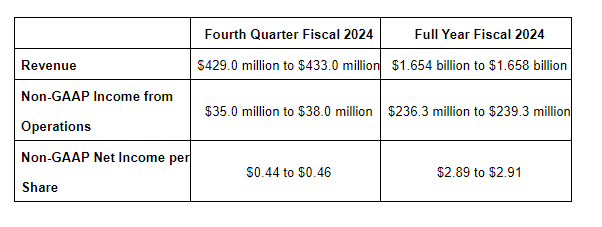
Guidance for FQ24 and full year (MongoDB Q3 FY2024 press release)
How crazy is the valuation?
MongoDB is a great company, growing fast and providing a service that is loved by the developers. However, investors have to reckon with the fact that shares are currently trading at a valuation that is far from reasonable, at least from a fundamental, value-oriented point of view. There are no GAAP profits to rely on, while the company only recently has been starting to report positive free cash flow: these two metrics are therefore rather useless to value the company. As far as revenue goes Price to Sales sits at 17.5x, not quite an insane level as during the COVID-induced market bubble (when MDB reached highs of 45x) but still around the top of market valuations. Does MongoDB deserve this valuation? Does any stock, actually?
Hard to say. Growth stocks are beasts of their own, often trading on momentum, carried by narratives and excitement. The rock-bottom interest rates of the last 15 years are a thing of the past, however recent exuberance regarding a potential interest rate cut by the Federal Reserve has actually pushed MongoDB’s share price not that far from all-time highs, all things considered.
With growth stocks in my view it is very important to first understand if there’s actually meat on the bone. I do think that MDB has the potential to be the real deal and provide another decade-plus of relatively high growth. But how fast exactly should it grow to justify the current valuation?
In the trailing twelve months the company recorded about $88.7 million of free cash flow, translating to about 5.5% FCF margin. The company is only starting now to somewhat reliably be FCF positive, however I think this will soon become the norm rather than the exception. Thanks to amazing gross profits and scale, I think MDB will most likely reach about 20% FCF margin when fully optimized, which is in the range of SaaS businesses in the cloud space.
Now we do a bit of an imagination exercise. Let’s imagine that MongoDB is fully optimized today, and already boasts a great FCF margin of 20%. Based on $1.5 billion of TTM Revenue, the current imaginary FCF would be about $317 million. In order to justify the current valuation of $28.2 billion, while assuming a discount rate of 10% the company would need to achieve about 29% of FCF growth every year. Naturally, as today MongoDB is only achieving about 5.5% of FCF margin, the real growth rate needed to justify the current valuation is actually much higher than that, but it is impossible to know how quickly MongoDB will be able to fully optimize their operation, reign in expenses and operate at maximum profitability.
I personally would not recommend investing into anything at such valuation. At these levels expecting any additional return coming from multiples expansion seems foolish, therefore any future return must come directly from the business performance; however, MongoDB has to knock it out of the park simply to achieve an expected annual return of 10%, at least based on the hypothetical cash flow model outlined above. Too hard for me at these prices.
Slowly becoming profitable
Despite the very steep valuation the stock is trading at, the company seems still far from consistent profitability. On a GAAP basis, Operating margin and Profit margin are still very much negative but the picture is slowly improving. The most recent reading shows TTM operating and profit margins at roughly -11.7% and -14.8%, translating to a net loss of $235 million in the trailing twelve months.
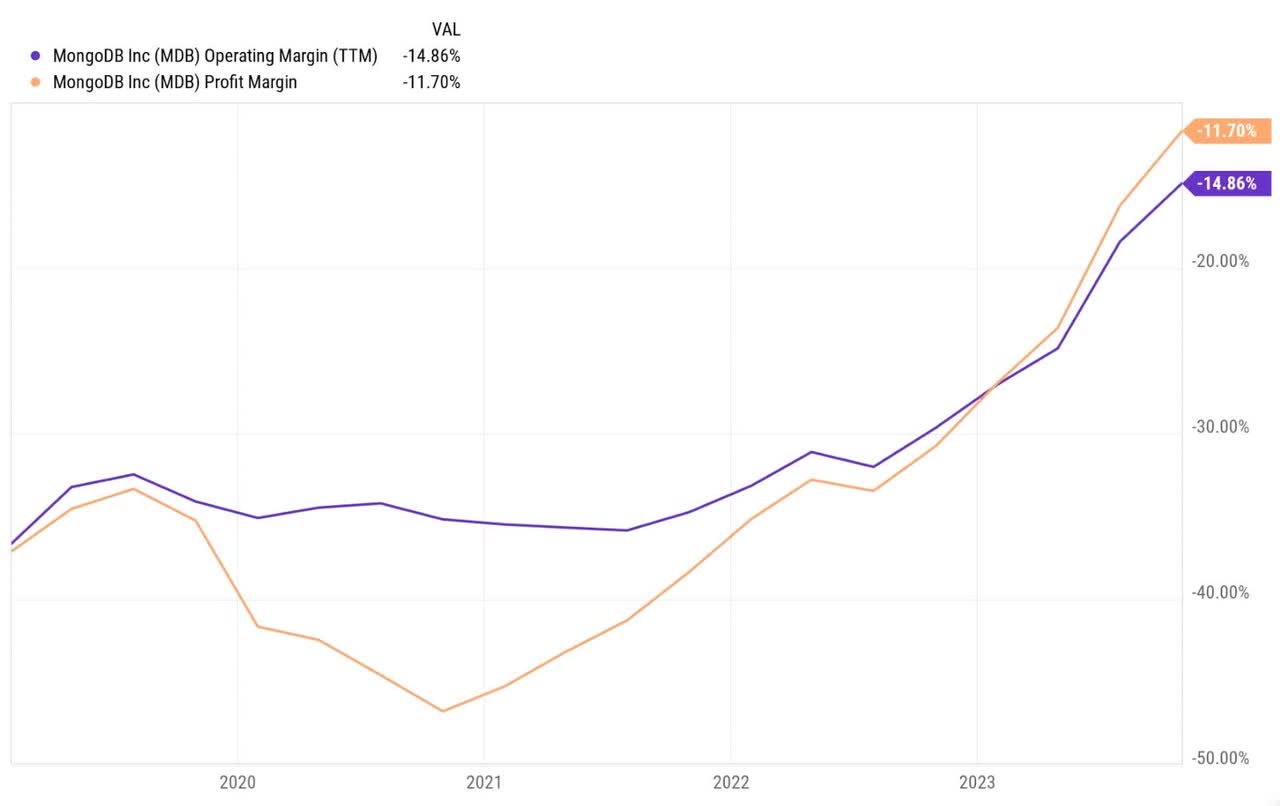
MongoDB is improving their operating efficiency (YCharts)
However, as with many other tech peers this is hardly the whole story. The company relies heavily on Stock-Based Compensation (”SBC”) to reward its employees, which is not a cash expense. By stripping out SBC and other non-cash adjustments, the company in the last four 4 quarters managed to be free cash flow positive in three of them, maybe proving that they finally turned a corner and started to reliably earn positive cash from their operations.
Another indication that they might have turned a corner is the rate of growth of their operational expenses. For the past four quarters, both cost of revenue and total operating expenses have consistently grown much slower than total revenue. That means that the company has started to be more efficient in their operations, and any of the future growth will accrue more and more towards their bottom line. I fully expect free cash flow to be consistently positive from now on, while for the net income to turn positive will require a much longer time due to the high nominal value of the SBC issued by the company every year.
Funnily enough, the area where MDB more consistently profits is from the interest earned on their $1.4 billion invested in marketable securities, most likely short-term Treasuries or money market funds. That is quite ironic considering that rising interest rates has been the most important reason that caused a growth stock bloodbath during 2022, but now actually allows MongoDB to earn pretty good returns reliably: after taking into consideration their minor debt obligations, in the last 12 months the company earned $64 million from interests on their investments, an amount comparable to their actual free cash flow but arguably even better as it’s more reliable and predictable.
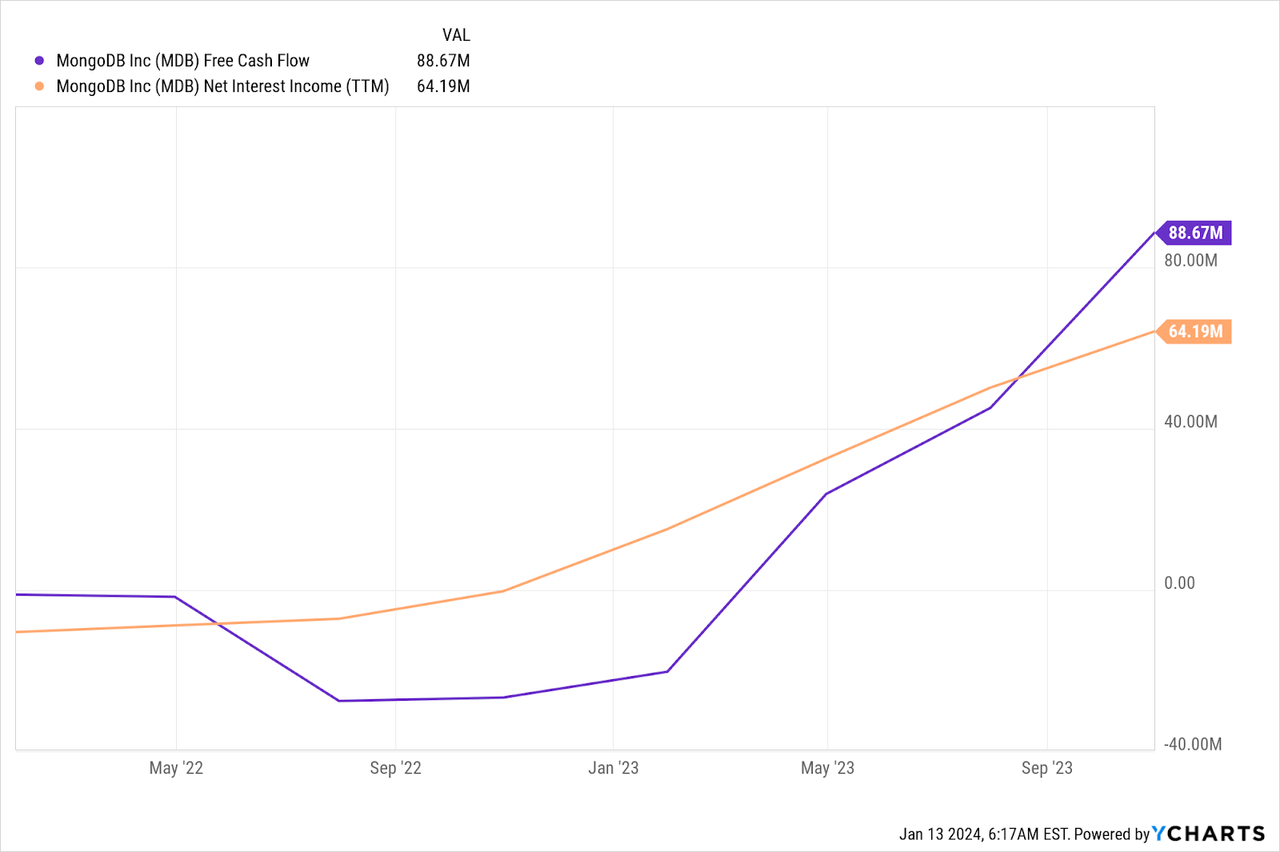
YCharts
In any case, an inescapable drag when companies extensively rely on SBC is shareholder dilution. During the last 4 full years (2020 to 2023) MDB has increased the number of shares outstanding by a yearly average of 6%. One could argue that this is irrelevant given that the stock price more than doubled in the same time frame, however this can expose investors to real pain if the market stops trading exuberantly, or if MDB makes some mistake along the way that either changes the narrative around them or directly impacts their results. At the very least dilution is something that investors should be aware of, and take it into consideration when assessing how risky an investment is.
Conclusion
MongoDB is a great company and has the potential to become a wonderful one someday. That might be enough for some investors to initiate a position, maybe even at any price. For me however, I just cannot justify an investment at this valuation in pretty much anything.
I like how MDB is showing significant improvements in their profitability and I would be surprised if they won’t be consistently FCF profitable already next year. The numbers clearly say that they provide services that customers love, and are able to do it consistently above 70% gross profit margin which is an amazing indication of potentially high profitability in future.
The risk however of buying something at 17.5 times sales is that any bump on the road might push your position in the red for many years. I think it’s too great of a risk for me, which makes MDB just a wonderful addition to a not so exciting watchlist.
Java News Roundup: Final JEP Drafts, Payara 2024 Roadmap, TornadoVM Plugin for IntelliJ

MMS • Michael Redlich

This week’s Java roundup for January 8th, 2024 features news highlighting: JEP drafts for final versions of OpenJDK features String Templates and Implicitly Declared Classes and Instance Main Methods; the Payara Platform 2024 roadmap; and a new TornadoVM plugin for IntelliJ IDEA.
OpenJDK
Ron Pressler, Architect and Technical Lead for Project Loom at Oracle, and Jim Laskey, Software Development Director at Oracle, have submitted JEP Draft 8323335, Implicitly Declared Classes and Instance Main Methods (Final) to finalize this feature. Formerly known as Unnamed Classes and Instance Main Methods (Preview), Flexible Main Methods and Anonymous Main Classes (Preview) and Implicit Classes and Enhanced Main Methods (Preview), this JEP incorporates enhancements in response to feedback from the two previous rounds of preview, namely JEP 463, Implicit Classes and Instance Main Methods (Second Preview), to be delivered in the upcoming release of JDK 22, and JEP 445, Unnamed Classes and Instance Main Methods (Preview), delivered in JDK 21. This JEP proposes to “evolve the Java language so that students can write their first programs without needing to understand language features designed for large programs.” This JEP moves forward the September 2022 blog post, Paving the on-ramp, by Brian Goetz, Java Language Architect at Oracle. The latest draft of the specification document by Gavin Bierman, Consulting Member of Technical Staff at Oracle, is open for review by the Java community. More details on JEP 445 may be found in this InfoQ news story.
Laskey has also submitted JEP Draft 8323333, String Templates (Final), to finalize this feature after two rounds of preview, namely JEP 459, String Templates (Second Preview), to be delivered in the upcoming release of JDK 22, and JEP 430, String Templates (Preview), delivered in JDK 21. This JEP proposes to enhance the Java programming language with string templates, string literals containing embedded expressions, that are interpreted at runtime where the embedded expressions are evaluated and verified. Further details on JEP 430 may be found in this InfoQ news story.
JDK 23
Build 5 of the JDK 23 early-access builds was made available this past week featuring updates from Build 4 that include fixes for various issues. More details on this release may be found in the release notes.
JDK 22
Build 31 of the JDK 22 early-access builds was also made available this past week featuring updates from Build 30 that include fixes to various issues. Further details on this build may be found in the release notes.
For JDK 23 and JDK 22, developers are encouraged to report bugs via the Java Bug Database.
Spring Framework
Versions 6.1.3 and 6.0.16 of Spring Framework have been released featuring bug fixes, improvements in documentation, dependency upgrades and new features such as: exclude full request URIs containing sensitive query parameters from remaining mono checkpoints while using the WebClient interface; allow the @CrossOrigin annotation to provide a Access-Control-Allow-Private-Network header from an application to Google Chrome if the Access-Control-Request-Private-Network header (Private Network Access) is sent in the preflight request; and avoid early resolution of the getMostSpecificMethod() method defined in the ClassUtils class from within the CommonAnnotationBeanPostProcessor class due to it being called at an outer level before finding an annotation. These versions will be shipped with the upcoming releases of Spring Boot 3.2.2 and 3.1.8. More details on these releases may be found in the release notes for version 6.1.3 and version 6.0.16.
Versions 2023.1.2 and 2023.0.8 of Spring Data have been released providing bug fixes and respective dependency upgrades to sub-projects such as: Spring Data Commons 3.2.2 and 3.1.8; Spring Data MongoDB 4.2.2 and 4.1.8; Spring Data Elasticsearch 5.2.2 and 5.1.8; and Spring Data Neo4j 7.2.2 and 7.1.8. These versions may also be consumed by the upcoming releases of Spring Boot 3.2.2 and 3.1.8, respectively.
The release of Spring Web Services 4.0.10 ships with notable changes such as: support for jar:nested, a URI scheme for resources within uber JARs as part of a new loader implementation in Spring Boot 3.2, within the SchemaFactoryUtils class; removal of a duplicate dependency declaration for the Apache HttpComponents HttpClient interface; and a dependency upgrade to Spring Framework 6.0.16. Further details on this release may be found in the release notes.
The release of Spring Cloud Dataflow 2.11.2 delivers notable changes such as: an upgrade to Logback 1.2.13 to resolve CVE-2023-6378, a serialization vulnerability in the Logback receiver component that allows an attacker to mount a denial-of-service attack by sending poisoned data; update the BatchVersion enum and the JdbcSearchableJobExecutionDao class to support use of the JOB_CONFIGURATION_LOCATION field that was removed in Batch5-based schemas that broke some queries; and a resolution to the getJobExecutionsWithStepCountFilteredByTaskExecutionId() method in the aforementioned JdbcSearchableJobExecutionDao class does not support BATCH_ task prefixes. More details on this release may be found in the release notes.
Payara
The Payara team has provided a retrospective on 2023 and a roadmap for the Payara Platform in 2024 and beyond. Highlights in 2023 included: the release of Payara Platform 6; support for JDK 21 and MicroProfile 6.1; and the introduction of Payara Starter. The comprehensive roadmap for 2024 includes: their vision for all Payara products through 2026; detailed individual roadmaps of Payara Server, Payara Micro, Payara Cloud and Payara Developer Tools; and support for Jakarta EE 11, scheduled for a GA release in June/July 2024. More details may be found in Empowering Enterprise Innovation with Jakarta EE, presented at the December 2023 Payara Virtual Conference by Louise Castens, Senior Product Manager at Payara, and Luqman Saeed, Contract Technical Writer at Payara.
TornadoVM
TornadoInsight, an “open-source IntelliJ IDEA plugin for enhancing the developer experience when working with TornadoVM,” was introduced by the TornadoVM team this past week. Key features include: an on-the-fly static checker that scans TornadoVM code in real-time and reports any Java features that are not supported by TornadoVM; and a dynamic testing framework to simplify the testing process for individual TornadoVM tasks. InfoQ will follow up with a more detailed news story.
Micrometer
Versions 1.12.2 and 1.11.8 of Micrometer Metrics both deliver dependency upgrades and notable bug fixes such as: add the missing version declarations in the io.netty:netty-transport-native-epoll artifact in the POM file that yielded a compile error; a rename of the thread that polls meters in the StepMeterRegistry class that shared the same name with a publishing thread; and a fix in the unaryRpcAsync() method defined in the GrpcObservationTest class for improved concurrency. Further details on these releases may be found in the release notes for version 1.12.2 and version 1.11.8.
Similarly, versions 1.2.2 and 1.1.9 of Micrometer Tracing both provide dependency upgrades and notable bug fixes such as: the SimpleTraceContextBuilder class not overriding values from an implementation of the TraceContext interface; and manually created baggage fields do not propagate across threads using the ObservationAwareSpanThreadLocalAccessor class. More details on these releases may be found in the release notes for version 1.2.2 and version 1.1.9.
Project Reactor
Project Reactor 2023.0.2, the second maintenance release, provides dependency upgrades to reactor-core 3.6.2, reactor-netty 1.1.15 and reactor-pool 1.0.5. There was also a realignment to version 2023.0.2 with the reactor-kafka 1.3.22, reactor-addons 3.5.1 and reactor-kotlin-extensions 1.2.2 artifacts that remain unchanged. Further details on this release may be found in the changelog.
Next, Project Reactor 2022.0.15, the fifteenth maintenance release, provides dependency upgrades to reactor-core 3.5.14, reactor-netty 1.1.15 and reactor-pool 1.0.5. There was also a realignment to version 2022.0.15 with the reactor-kafka 1.3.22, reactor-addons 3.5.1 and reactor-kotlin-extensions 1.2.2 artifacts that remain unchanged. More details on this release may be found in the changelog.
And finally, the release of Project Reactor 2020.0.40, codenamed Europium-SR40, provides dependency upgrades to reactor-core 3.4.35 and reactor-netty 1.0.41. There was also a realignment to version 2020.0.40 with the reactor-pool 0.2.12, reactor-kafka 1.3.22, reactor-addons 3.4.10, reactor-kotlin-extensions 1.1.10 and reactor-rabbitmq 1.5.6 artifacts that remain unchanged. Further details on this release may be found in the changelog.
Apache Software Foundation
Versions 11.0.0-M16, 10.1.18, 9.0.85 and 8.5.98 of Apache Tomcat all feature bug fixes and notable changes such as: refactor the VirtualThreadExecutor class so that it can be used by the NIO2 connector which was using platform threads despite having been configured to use virtual threads; correct a regression in the fix for issue 67675 that broke TLS key file parsing for format keys typically generated by OpenSSL 1.0.2 that do not specify an explicit pseudo-random function and only rely on the default; and allow multiple operations with the same name on introspected MBeans, fixing a regression caused by the introduction of a second addSslHostConfig() method. More details on these releases may be found in the release notes for version 11.0.0-M16, version 10.1.18, version 9.0.85 and version 8.5.98.
After the release of Apache Cocoon 2.3.0, the team has recently decided to retire the 2.1 and 3.0 branches of Cocoon. The 2.1 branch, initially released more than 20 years ago, is now considered obsolete. The 3.0 branch was an attempt to rewrite Cocoon from scratch, but was never finalized. Apache Cocoon, a Spring-based framework (since version 2.2), is built around the concepts of separation of concerns and component-based development.
Grails
The Grails Foundation has released versions 5.3.6 and 3.3.18 of the Grails Framework with notable changes such as: revert the recent upgrade to SnakeYAML, Micronaut, Spring and Spring Boot because they were not backward compatible; add a workflow to manually trigger a release to SDKMan; and update the NexusPublishing extension to increase the delay of retries from 2000 to 3000 milliseconds. Further details on these releases may be found in the release notes for version 5.3.6 and version 3.3.18.
Piranha Cloud
The release of Piranha 23.12.0 delivers notable changes such as: a resolution to a Windows build failure by downgrading Eclipse WaSP, the compatible implementation for Jakarta Pages and Jakarta Standard Tag Library, from version 3.2.1 to 3.2.0; a new UberPiranha class and corresponding uber module to initialize Piranha on the command line; and the ability to set a temporary directory for Piranha Uber. More details on this release may be found in their documentation and issue tracker.
OpenXava
The release of OpenXava 7.2.2 provides dependency upgrades and notable bug fixes such as: multiple @RowStyle annotations applied to the same row, but only one is considered; the @ListProperties annotation does not support several properties when used in conjunction with the @Tree or @Editor("TreeView") annotations; and database connection leaks when using the calendar list format. Further details on this release may be found in the release notes.
Gradle
The second release candidate of Gradle 8.6 provides continuous improvement in: support for custom encryption keys in the configuration cache via the GRADLE_ENCRYPTION_KEY environment variable; improvements in error and warning reporting; improvements in the Build Init Plugin to support various types of projects; and enhanced build authoring for plugin authors and build engineers to develop custom build logic. More details on this release may be found in the release notes.

MMS • Andrew Hoblitzell

After it was reported that OpenAI has started rolling out its new GPT Store, it was also discovered that some of the data they’re built on is easily exposed. Multiple groups have begun finding that the system has the potential to leak otherwise sensitive information.
Researchers from Northwestern University wrote “through comprehensive testing of over 200 user-designed GPT models via adversarial prompts, we demonstrate that these systems are susceptible to prompt injections.” Prompt injection attacks are a known vulnerability vector to extract sensitive information or manipulate the model’s output. Prompt injection is just one at vulnerability for language models, with some others including prompt leaking and jailbreaking.
Prompt injection refers to the technique where an attacker crafts specific inputs or ‘prompts’ to manipulate the behavior of Large Language Models (LLMs) like GPTs. In their research, the team found that through prompt injection, “an adversary can not only extract the customized system prompts but also access uploaded files.”
Yesterday I created a custom GPT for http://Levels.fyi with a limited subset of our data as a knowledge source (RAG). The feedback was incredible and folks got super creative with some of their prompts. However, I found out shortly that the source data file was leaking. – Zuhayeer Musa
“Our findings underscore the urgent need for robust security frameworks in the design and deployment of customizable GPT models.” They emphasize that while customization opens up new frontiers in AI utility by allowing individuals and organizations to create AI models tailored for specific needs without necessitating coding skills; it also introduces additional vectors for potential security vulnerabilities.
“We identified key security risks related to prompt injection and conducted an extensive evaluation… Our tests revealed that these prompts could almost entirely expose system prompts and retrieve uploaded files from most custom GPTS.” This indicates a significant vulnerability in current custom GPTs regarding system prompt extraction and file disclosure.
The researchers conclude their paper with an urgent call to action: “Our findings highlight the urgent need for enhanced security measures in the rapidly evolving domain of customizable AI, and we hope this sparks further discussion on the subject.” They stress that as AI technologies continue to evolve, it is crucial to strike a balance between innovation and security.
Adversa AI also recently showed that GPTs may be tricked into leaking how they were built, including prompts, API names, and uploaded document metadata and content. OpenAI noted it had patched the vulnerabilities reported by the Adversa AI researchers.
“We’re constantly working to make our models and products safer and more robust against adversarial attacks, including prompt injections, while also maintaining the models’ usefulness and task performance.” – OpenAI to Wired
Developers interested in learning more about the work from Northwestern University may read the technical paper on Arxiv or follow reaction on social media.
How does ports in the server on react connect to the ports in front end for database to store values?

MMS • RSS

Hi Team
I have a server js file that connects to the database and i am using mongodb, the issue is on the ports they dont seem to communicate to the server. Meaning when i click register button from the front end. I get 404 status. Here is an error ” “
registration.js:17
POST http://localhost:3000/register 500 (Internal Server Error)
registration.js:24 Registration failed:
AxiosError {message: ‘Request failed with status code 500’, name: ‘AxiosError’, code: ‘ERR_BAD_RESPONSE’, config: {…}, request: XMLHttpRequest, …}
code
:
“ERR_BAD_RESPONSE”
config
:
{transitional: {…}, adapter: Array(2), transformRequest: Array(1), transformResponse: Array(1), timeout: 0, …}
message
:
“Request failed with status code 500”
name
:
“AxiosError”
request
:
XMLHttpRequest {onreadystatechange: null, readyState: 4, timeout: 0, withCredentials: false, upload: XMLHttpRequestUpload, …}
response
:
{data: {…}, status: 500, statusText: ‘Internal Server Error’, headers: AxiosHeaders, config: {…}, …}
stack
:
“AxiosError: Request failed with status code 500n at settle (http://localhost:3001/static/js/bundle.js:50189:12)n at XMLHttpRequest.onloadend (http://localhost:3001/static/js/bundle.js:48871:66)”
[[Prototype]]
:
Error”// back end server.js
const express = require('express'); const cors = require('cors'); const mongoose = require('mongoose'); const bcrypt = require('bcrypt'); const app = express(); const PORT = 3000; // Enable CORS app.use(cors()); // Connect to MongoDB Atlas const username = 'ggcobani'; const password = '*****'; const database = 'cluster0'; const uri = `mongodb+srv://${username}:${password}@cluster0.dps9ft3.mongodb.net/${database}`; mongoose.connect(uri, { useNewUrlParser: true, }) .then(() => { console.log('Connected to MongoDB Atlas'); }) .catch((error) => { console.error('MongoDB Atlas connection error:', error); }); // Middleware to parse JSON in the request body app.use(express.urlencoded({ extended: true })); // User model const User = mongoose.model('User', { username: String, email: String, password: String, }); app.post('/register', async (req, res) => { console.log('Received registration request'); const { username, email, password } = req.body; try { // Check if user already exists const existingUser = await User.findOne({ email }); if (existingUser) { return res.status(400).json({ message: 'User already exists' }); } if (!password) { return res.status(400).json({ message: 'Password is required' }); } // Hash the password const hashedPassword = await bcrypt.hash(password, 10); // Create a new user const newUser = new User({ username, email, password: hashedPassword }); // Save the new user await newUser.save(); res.status(201).json({ message: 'User registered successfully' }); } catch (error) { console.error('Registration failed:', error.message); res.status(500).json({ message: 'Internal Server Error' }); } }); // Login endpoint app.post('/login', async (req, res) => { const { email, password } = req.body; // Find the user by email const user = await User.findOne({ email }); if (!user) { return res.status(404).json({ message: 'User not found' }); } // Compare passwords const passwordMatch = await bcrypt.compare(password, user.password); if (!passwordMatch) { return res.status(401).json({ message: 'Incorrect password' }); } res.json({ message: 'Login successful' }); }); // Start the server app.listen(PORT, () => { console.log(`Server is running on port ${PORT}`); }); // front end import React,{useState} from "react"; import axios from "axios"; // registration function function Registration() { const [username, setUsername] = useState(''); const [email, setEmail] = useState(''); const [password, setPassword] = useState(''); // handling of submit button during registration const handleSubmit = async (e) => { e.preventDefault(); try { await axios.post('http://localhost:3000/register', { username, email, password }, { headers: { 'Content-Type': 'application/json', }, }); console.log('User registered successfully'); } catch (error) { console.log('Registration failed:', error); } }; // return submit from the form. return (); } export default Registration;Registration Form
setUsername(e.target.value)} />setEmail(e.target.value)} />setPassword(e.target.value)} />
Cambridge Investment Research Advisors Inc. Sells 57 Shares of MongoDB, Inc. (NASDAQ:MDB)

MMS • RSS
 Cambridge Investment Research Advisors Inc. lessened its holdings in shares of MongoDB, Inc. (NASDAQ:MDB – Free Report) by 1.2% in the third quarter, according to the company in its most recent 13F filing with the Securities and Exchange Commission. The fund owned 4,787 shares of the company’s stock after selling 57 shares during the quarter. Cambridge Investment Research Advisors Inc.’s holdings in MongoDB were worth $1,656,000 at the end of the most recent quarter.
Cambridge Investment Research Advisors Inc. lessened its holdings in shares of MongoDB, Inc. (NASDAQ:MDB – Free Report) by 1.2% in the third quarter, according to the company in its most recent 13F filing with the Securities and Exchange Commission. The fund owned 4,787 shares of the company’s stock after selling 57 shares during the quarter. Cambridge Investment Research Advisors Inc.’s holdings in MongoDB were worth $1,656,000 at the end of the most recent quarter.
Several other hedge funds have also bought and sold shares of MDB. Jennison Associates LLC raised its holdings in shares of MongoDB by 101,056.3% during the 2nd quarter. Jennison Associates LLC now owns 1,988,733 shares of the company’s stock valued at $817,350,000 after buying an additional 1,986,767 shares in the last quarter. 1832 Asset Management L.P. raised its stake in shares of MongoDB by 3,283,771.0% during the fourth quarter. 1832 Asset Management L.P. now owns 1,018,000 shares of the company’s stock worth $200,383,000 after acquiring an additional 1,017,969 shares in the last quarter. Norges Bank bought a new stake in shares of MongoDB in the 4th quarter worth approximately $147,735,000. T. Rowe Price Investment Management Inc. boosted its stake in shares of MongoDB by 77.4% in the 4th quarter. T. Rowe Price Investment Management Inc. now owns 568,803 shares of the company’s stock valued at $111,964,000 after purchasing an additional 248,133 shares in the last quarter. Finally, Dorsal Capital Management LLC grew its holdings in shares of MongoDB by 100.0% during the 4th quarter. Dorsal Capital Management LLC now owns 400,000 shares of the company’s stock valued at $78,736,000 after purchasing an additional 200,000 shares during the last quarter. 88.89% of the stock is currently owned by institutional investors.
Insiders Place Their Bets
In other news, CAO Thomas Bull sold 359 shares of the company’s stock in a transaction on Tuesday, January 2nd. The stock was sold at an average price of $404.38, for a total transaction of $145,172.42. Following the transaction, the chief accounting officer now directly owns 16,313 shares of the company’s stock, valued at $6,596,650.94. The sale was disclosed in a filing with the SEC, which is available at the SEC website. In other news, CAO Thomas Bull sold 359 shares of the business’s stock in a transaction that occurred on Tuesday, January 2nd. The shares were sold at an average price of $404.38, for a total transaction of $145,172.42. Following the completion of the transaction, the chief accounting officer now directly owns 16,313 shares of the company’s stock, valued at $6,596,650.94. The transaction was disclosed in a filing with the Securities & Exchange Commission, which can be accessed through the SEC website. Also, CFO Michael Lawrence Gordon sold 7,577 shares of the business’s stock in a transaction on Monday, November 27th. The shares were sold at an average price of $410.03, for a total transaction of $3,106,797.31. Following the sale, the chief financial officer now owns 89,027 shares of the company’s stock, valued at $36,503,740.81. The disclosure for this sale can be found here. In the last quarter, insiders sold 147,029 shares of company stock valued at $56,304,511. Corporate insiders own 4.80% of the company’s stock.
MongoDB Stock Performance
Shares of MongoDB stock opened at $391.59 on Friday. MongoDB, Inc. has a 1 year low of $179.52 and a 1 year high of $442.84. The firm’s 50-day moving average is $397.23 and its 200 day moving average is $380.93. The stock has a market cap of $28.26 billion, a price-to-earnings ratio of -148.33 and a beta of 1.23. The company has a debt-to-equity ratio of 1.18, a current ratio of 4.74 and a quick ratio of 4.74.
MongoDB (NASDAQ:MDB – Get Free Report) last issued its earnings results on Tuesday, December 5th. The company reported $0.96 earnings per share (EPS) for the quarter, topping the consensus estimate of $0.51 by $0.45. MongoDB had a negative net margin of 11.70% and a negative return on equity of 20.64%. The firm had revenue of $432.94 million for the quarter, compared to the consensus estimate of $406.33 million. During the same quarter in the prior year, the firm posted ($1.23) earnings per share. The business’s revenue was up 29.8% on a year-over-year basis. Sell-side analysts anticipate that MongoDB, Inc. will post -1.64 EPS for the current fiscal year.
Analyst Upgrades and Downgrades
Several research firms have issued reports on MDB. TheStreet upgraded shares of MongoDB from a “d+” rating to a “c-” rating in a research report on Friday, December 1st. Bank of America started coverage on shares of MongoDB in a research report on Thursday, October 12th. They set a “buy” rating and a $450.00 price target for the company. Capital One Financial upgraded shares of MongoDB from an “equal weight” rating to an “overweight” rating and set a $427.00 target price for the company in a report on Wednesday, November 8th. Mizuho boosted their price target on MongoDB from $330.00 to $420.00 and gave the company a “neutral” rating in a report on Wednesday, December 6th. Finally, UBS Group reiterated a “neutral” rating and issued a $410.00 price objective (down previously from $475.00) on shares of MongoDB in a report on Thursday, January 4th. One research analyst has rated the stock with a sell rating, three have given a hold rating and twenty-one have assigned a buy rating to the company. According to data from MarketBeat, the company presently has a consensus rating of “Moderate Buy” and an average target price of $430.41.
Check Out Our Latest Stock Analysis on MongoDB
MongoDB Profile
MongoDB, Inc provides general purpose database platform worldwide. The company offers MongoDB Atlas, a hosted multi-cloud database-as-a-service solution; MongoDB Enterprise Advanced, a commercial database server for enterprise customers to run in the cloud, on-premise, or in a hybrid environment; and Community Server, a free-to-download version of its database, which includes the functionality that developers need to get started with MongoDB.
Further Reading
Receive News & Ratings for MongoDB Daily – Enter your email address below to receive a concise daily summary of the latest news and analysts’ ratings for MongoDB and related companies with MarketBeat.com’s FREE daily email newsletter.

MMS • RSS
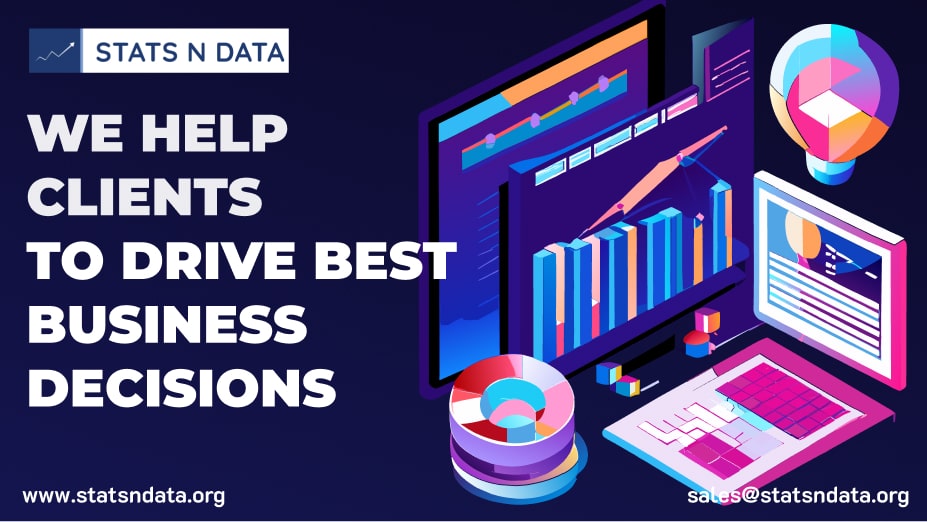
[New York, January 2024] — An insightful market analysis report focusing on the NoSQL Software Market has just been released by Stats N Data, serving as a valuable resource for both industry leaders and newcomers. This comprehensive report offers a detailed exploration of the global NoSQL Software market and its subsegments, providing revenue forecasts and strategic insights that can drive business success in the coming years in service-industries Industry.
Get a sample report:https://www.statsndata.org/download-sample.php?id=48377
In addition to answering these critical questions, the report offers a forward-looking perspective, providing insights into the future trajectory of the NoSQL Software market. It equips decision-makers with the knowledge needed to navigate the market’s evolution during the forecasted period effectively.
Some of the major companies influencing this NoSQL Software market include:
• MongoDB
• Amazon
• ArangoDB
• Azure Cosmos DB
• Couchbase
• MarkLogic
• RethinkDB
• CouchDB
• SQL-RD
• OrientDB
• RavenDB
• Redis
• Microsoft
This NoSQL Software research report sheds light on the major market players who are thriving in the market. Track business strategy, financial status and upcoming products.
This report caters to a wide audience, from industry experts seeking insights into the dynamic NoSQL Software market to newcomers looking for guidance. Customization options are available to ensure the report’s relevance to your specific needs.
NoSQL Software The regional scope of the market is mostly mentioned in the region-focused report.
• North America
• South America
• Asia Pacific
• Middle East and Africa
• Europe
Don’t miss our exclusive 20% discount on this report: https://www.statsndata.org/ask-for-discount.php?id=48377
NoSQL Software Market Segmentation Analysis
The market is segmented on the basis of categories such as type, product, and end user. This segmentation makes it possible to provide an accurate description of the market.
NoSQL Software Market segmentation : By Type
• E-Commerce
• Social Networking
• Data Analytics
• Data Storage
• Others
NoSQL Software Market Segmentation: By Application
• Cloud Based
• Web Based
Key Questions Addressed in this Report:
- What is the expected market size and growth rate during the forecast period?
- What are the key factors propelling the NoSQL Software market?
- What risks and challenges lie ahead in the market?
- Who are the prominent players in the NoSQL Software market?
- What trends are influencing market shares?
- What are the primary findings from Porter’s five forces model?
- What global expansion opportunities are available for the NoSQL Software market?
| Segmentation | Specification |
|---|---|
| Historic Study on NoSQL Software | 2020 – 2023 |
| Future Forecast NoSQL Software | 2024 – 2030 |
| Company Accounted | • MongoDB • Amazon • ArangoDB • Azure Cosmos DB • Couchbase • MarkLogic • RethinkDB • CouchDB • SQL-RD • OrientDB • RavenDB • Redis • Microsoft |
| Types | • E-Commerce • Social Networking • Data Analytics • Data Storage • Others |
| Application | • Cloud Based • Web Based |
Conclusion
Embrace data-driven decision-making with our comprehensive NoSQL Software market research report. It’s your roadmap to navigate the ever-changing market landscape and position your business for success.
Table Of Content
Chapter 1 NoSQL Software Market Overview
1.1 Product Overview and Scope of NoSQL Software
1.2 NoSQL Software Market Segmentation by Type
1.3 NoSQL Software Market Segmentation by Application
1.4 NoSQL Software Market Segmentation by Regions
1.5 Global Market Size (Value) of NoSQL Software (2020-2030)
Chapter 2 Global Economic Impact on NoSQL Software Industry
2.1 Global Macroeconomic Environment Analysis
2.2 Global Macroeconomic Environment Analysis by Regions
Chapter 3 Global NoSQL Software Market Competition by Manufacturers
3.1 Global NoSQL Software Production and Share by Manufacturers (2020 to 2024)
3.2 Global NoSQL Software Revenue and Share by Manufacturers (2020 to 2024)
3.3 Global NoSQL Software Average Price by Manufacturers (2020 to 2024)
3.4 Manufacturers NoSQL Software Manufacturing Base Distribution, Production Area and Product Type
3.5 NoSQL Software Market Competitive Situation and Trends
Chapter 4 Global NoSQL Software Production, Revenue (Value) by Region (2020-2024)
4.1 Global NoSQL Software Production by Region (2020-2024)
4.2 Global NoSQL Software Production Market Share by Region (2020-2024)
4.3 Global NoSQL Software Revenue (Value) and Market Share by Region (2020-2024)
4.4 Global NoSQL Software Production, Revenue, Price and Gross Margin (2020-2024)
Continue…
Customization Requests:https://www.statsndata.org/request-customization.php?id=48377
Contact Us